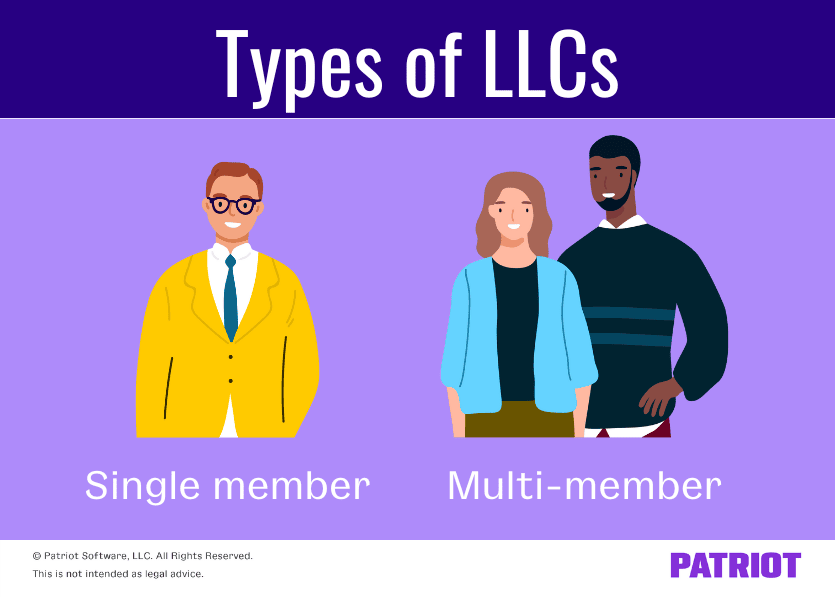When it comes to forming a business, there are a number of business structures you can choose from. Your structure can determine how you handle taxes and which forms you need to file. One business entity you can choose is an LLC. So, what is an LLC?
What is an LLC in business?
An LLC, or limited liability company, is one of the main types of business structures. A limited liability company combines the pass-through taxation benefits of a partnership (which we’ll discuss later) with the limited liability of a corporation. Many entrepreneurs choose the LLC route because of its flexibility.
Under an LLC, the owners are called members. There are two types of LLCs:
- Single member: Only one owner
- Multi-member: More than one owner
An LLC is a separate legal entity from its owners. This is where limited liability comes into play. Because it’s a separate legal entity, owners can put bank accounts, credit cards, and transactions under the business rather than using their personal information. This gives LLC owners financial and legal protection, similar to corporations.

Who can form an LLC?
The majority of entrepreneurs can start an LLC. However, each state sets its own rules for forming and operating an LLC. In some cases, you may not be able to form an LLC due to government regulations. So, it’s best to check with your state before trying to form a limited liability company.
You can also start an LLC in any state—not just the one you do business or live in. If you’re thinking about forming an LLC, do your research to find out which state is best to form an LLC.
LLC and taxes
Again, the taxes business entities are responsible for vary depending on business structure. Limited liabilities companies enjoy pass-through taxation. And, members need to pay a special type of tax. Take a look at LLC taxes and your tax liabilities as an owner.
Pass-through taxes
With pass-through taxation, the LLC itself does not pay income taxes. Instead, the owners report business income and pay taxes on their personal tax returns. The tax falls onto the owners, resulting in additional tax forms.
Pass-through taxation allows LLCs to avoid double taxation. With double taxation, the company is taxed at both the personal and business levels.
Single-member LLCs are taxed as sole proprietorships. Single-member LLC owners must report the business’s profits and losses by attaching Schedule C to their personal tax return.
Multi-member LLCs are treated like partnerships for taxes. Owners report business income and pay taxes on their personal tax returns. And, each owner must attach Schedule K-1 to their return. The multi-member LLC is also responsible for sending Form 1065 to the IRS.
Member taxes
Owners (aka members) of an LLC are considered self-employed. Because of this, owners must also pay self-employment taxes to the IRS each quarter. Self-employment taxes include Social Security and Medicare taxes.
LLC owners do not have taxes automatically withheld from their income. Instead, owners are responsible for estimating, paying, and reporting taxes.
If you’re an LLC member, estimate income taxes and pay your estimated taxes each quarter.
LLC pros and cons
Like any other business structure, there are some advantages and disadvantages of starting an LLC. Before you make any decisions about establishing an LLC, weigh the pros and cons.
Here are some LLC benefits:
- Limited liability (members are not personally responsible for business debts)
- Pass-through taxation
- Can be managed by members
- Easy to establish
- Ability to change tax structure (e.g., S Corp election)
- No limit on number of members
Check out a few cons of starting an LLC:
- Pay self-employment taxes
- File additional tax forms
- More difficult to raise money
- Cannot issue stock
- Limited life (dissolve or reform your LLC if an owner joins or leaves)
How to form an LLC
An LLC is one of the easiest structures to form. To start your LLC, follow the steps below:
- Decide which state to form your LLC in if you do business in multiple states
- Again, do your research to determine which state is the best one to start an LLC in
- Select your LLC’s name
- Doesn’t have to include owners’ names. However, some states require you to include “LLC” at the end of your legal name (e.g., Brown Photography LLC)
- Write up a business plan
- Includes market analysis, financial projections, and marketing plans for your LLC (this is optional, yet practical)
- Choose a registered agent
- Individual or company that agrees to accept legal papers on behalf of the LLC
- Prepare an operating agreement
- Outlines the rules and regulations of your limited liability company
- File articles of organization with your state
- Legal documents you must file with your state to structure as a limited liability company. You must file these to establish your LLC
Along with the above steps, you may need to pay a filing fee to become an LLC. This can depend on the state you’re filing in.
Keep in mind that each state has its own rules for starting an LLC. This means that the steps needed to form an LLC can also vary by state. Check with your state for additional information about creating a limited liability company.
Heads up! Beginning in 2024, the beneficial ownership information reporting rule requires LLCs to report identifying information to the federal government.
Converting your current structure to an LLC?
Thinking about converting your current business structure to an LLC? If you already own an existing business under a different structure (e.g., sole proprietorship, partnership, etc.), you generally can switch to an LLC.
Owners of sole proprietorships and partnerships benefit from the limited liability without having to change the way the business is taxed.
You can convert your company to an LLC the same way a new business forms one: by filing articles of organization with your state. To make the switch, you also need to change your identification numbers and licenses to the new name.
Some businesses, like banks and insurance companies, may not legally be able to convert to an LLC. Before you try to make any changes, consult your state to ensure it’s legal to convert your business structure.
Need an easy way to keep track of your transactions? We have the perfect solution for you. Patriot’s online accounting makes it a snap to record income and expenses in just a few simple steps. Plus, we offer free (and friendly!), USA-based support. Try it free for 30 days!
This article has been updated from its original publication date December 4, 2015.
This is not intended as legal advice; for more information, please click here.



